Blog / Education You Need for Success as an Addictions Worker: Instructors’ Insights
Education You Need for Success as an Addictions Worker: Instructors’ Insights
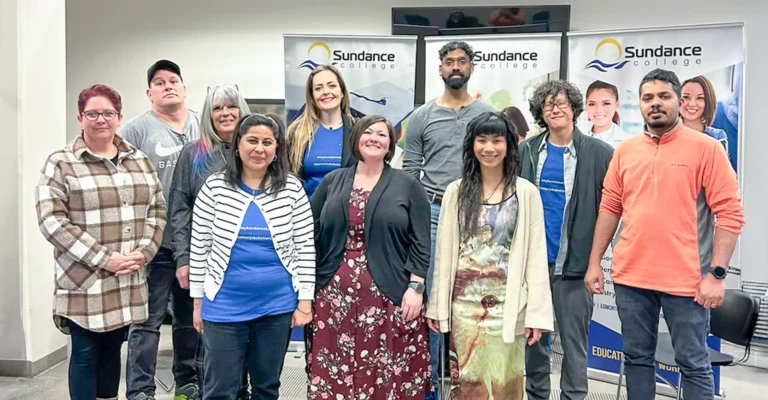
Addictions and Community Health Professional Diploma
- Addictions Worker
- Youth Support Worker
- Family Support Worker
- Drop-in Centre Worker
“Lack of knowledge in harm reduction, psychology, ethics, and drug effects can do more harm than good in the addictions field.”
This is what Addictions and Community Health Professional (ACHP) instructor Serena N. shares about the importance of education for those who want to work with people at risk.
With 12 years of experience in shelters and medical offices in Vancouver, Serena has worked with many at-risk individuals.
This guide shares insights from Sundance College ACHP instructors, Serena and Cinthya, who together have over 20 years of experience in mental health, addictions, and community health. Read on to discover how the right education equips you with everything you need for a successful career in addictions and community health.
Listen to “Education You Need for Success as an Addictions Worker: Instructors’ Insights”
Your Key to Success in Studying Addictions
The goal of every addictions worker is to provide client-centered care in an inclusive and safe environment. This requires not only essential skills but also being prepared personally for the challenges of the profession.
Sundance College ensures all students are emotionally prepared for the ACHP program. ACHP instructor Serena explains, “Before our students begin classes, we ensure they meet specific criteria for sobriety and have a support network in place. We want to make sure they’re well-prepared for what the program deals with.”
Let’s go into details and explore what your education program should provide to make you job-ready and excel in this meaningful and impactful profession.
Education You Need to Become an Addictions Worker
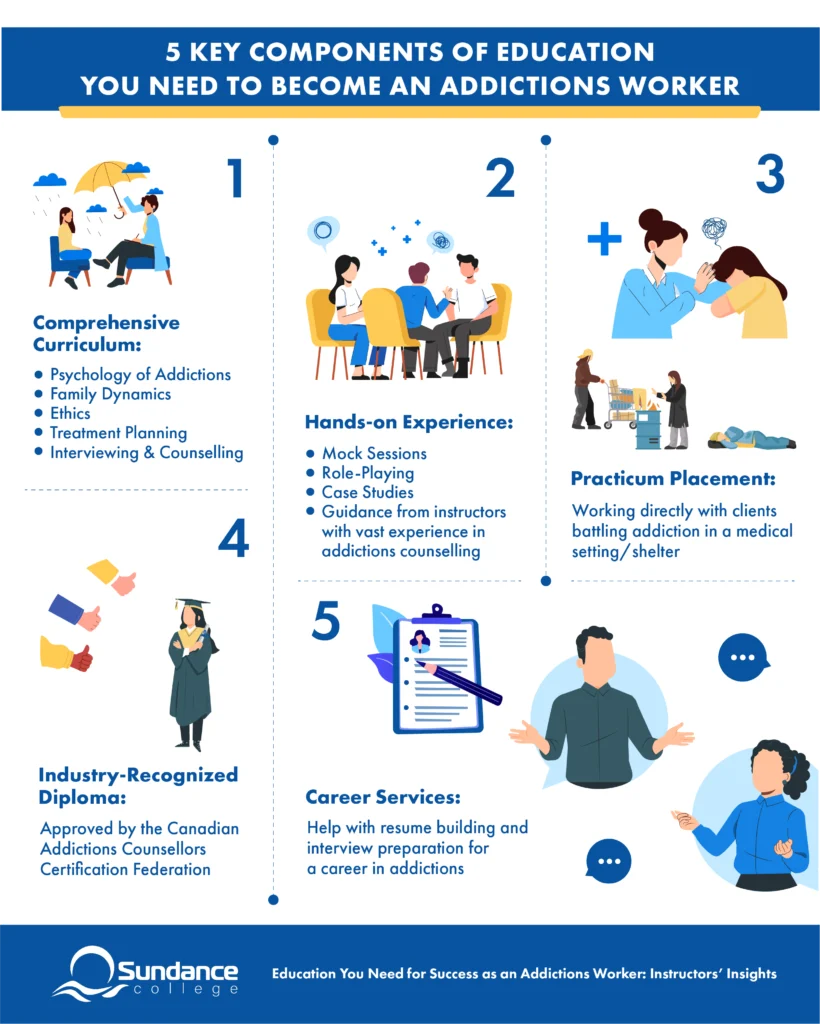
Becoming an effective addictions worker requires the right combination of passion for helping others and a solid foundation of knowledge, practical skills, and real-world experience.
That’s where the right education comes in. By ‘right’, we mean your educational program should include these five core components:
- Comprehensive curriculum covering vital subjects like the psychology of addiction, treatment planning, interviewing & counselling, relapse prevention, and harm reduction that will equip you with essential knowledge.
- Hands-on experience, guided by seasoned instructors, that will allow you to translate your applied knowledge into practical skills, preparing you for real-world scenarios.
- Practicum placement to apply your skills in a medical setting, working directly with clients battling addiction. This, in turn, will help you build confidence and competence to succeed in your future career.
- Industry-recognized diploma, such as Sundance’s Addictions and Community Health Professional Diploma, that has been approved by the Canadian Addictions Counsellors Certification Federation. It ensures your qualifications meet industry requirements after graduation.
- Career services, including resume building and interview preparation that will help you secure your first job in the addictions field, setting you on the path to a fulfilling career.
Now, let’s focus more on the necessary skills that certain courses of your education program can help you cultivate for your successful career in addictions, using our Addictions and Community Health Diploma program as an example.
Skills You Gain Through Your Addictions Diploma Program
First, let’s spotlight one fundamental skill the right education can help you develop – an “unconditional positive outlook” when working with clients.
Cinthya, our ACHP instructor, explains, “When starting a career in addictions, there has to be an unconditional positive attitude…When it comes to clients, you need to think, ‘I’m going to have a positive outlook on you and your ability to help yourself, because I’m here to support you in that process.’”
This perspective is crucial for students, as it helps them understand that their role is to support people in need and give them the tools they need to take ownership of their own paths to recovery. This is essential for success in an addictions career, and a quality educational program will aid in this skill development.
What other crucial skills can you acquire through your addictions and community health training?
Psychology Of Addiction
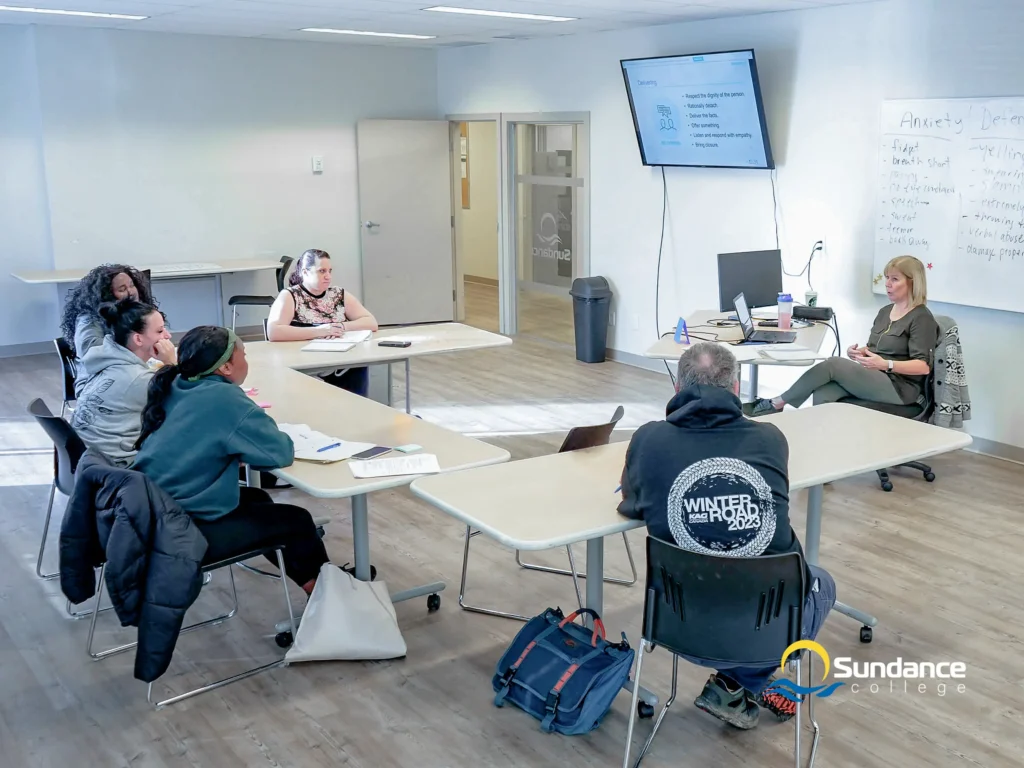
Understanding addiction involves exploring the way people think and behave, why they become addicted to certain vices, and how you can support them on their way to recovery.
Serena points out that the Psychology of Addiction course, as part of the ACHP program, “helps students understand how biology, personality, and learning affect addiction. Students also look at high-risk groups, like indigenous communities, and learn about the challenges they face. This helps them see why some people struggle with addiction more than others.’
Understanding the psychology of addiction can make you more compassionate and better at helping people with addiction problems. It’s a fundamental requirement of becoming a professional addictions worker and something you learn with the right program.
Intake Procedures & Treatment Planning
Through practicing intake procedures and treatment planning during your studies, you will learn intake, assessment, and the factors influencing case management and service delivery, all vital components for addictions workers. You’ll engage in role-playing, receive feedback, and participate in hands-on exercises to hone these skills.
Serena provides the details: “In our ACHP program, we use case studies to help students learn. They get to figure out what they would do in different situations. For example, they learn how to do intake forms and use counselling strategies by doing mock one-on-one sessions.”
Skills in intake procedures and substance abuse treatment planning are essential for your success in addictions work. Attaining them can be achieved by taking a proper education.
Interviewing & Counselling
The Interviewing and Counselling Strategies course in Sundance’s ACHP program teaches you how to help people with addictions through constructive and trust-based conversations. Cinthya highlights, “In this course, students learn specific questioning strategies, like the empathetic model. It allows them to ask questions in a way that makes clients feel comfortable and motivated to talk. These skills are useful whether students work directly with clients or welcome them into a facility.”
By taking this course, you become better at building trust with clients and creating a safe space for them to discuss their challenges without feeling judged. The skills in interviewing and counselling techniques are essential for helping people make positive changes in their lives – and for you to excel in your addictions worker career path!
Group Facilitation
Learning how to facilitate group sessions allows aspiring addictions workers to support multiple people at once. By understanding how to manage group dynamics and create a supportive environment, students learn how to help clients feel connected and motivated to work towards their goals together.
While studying the Group Facilitation Concepts course, you will explore topics such as group stages, processes, therapeutic interventions, and the purpose of groups. Also, you will learn how to introduce, conduct, and manage exercises and engage group members in addiction counselling and therapy sessions.
These skills are essential for becoming an effective addictions worker – and one of the primary goals of the Addictions and Community Health Professional diploma program is to equip you with them.
Relapse Prevention & Intervention
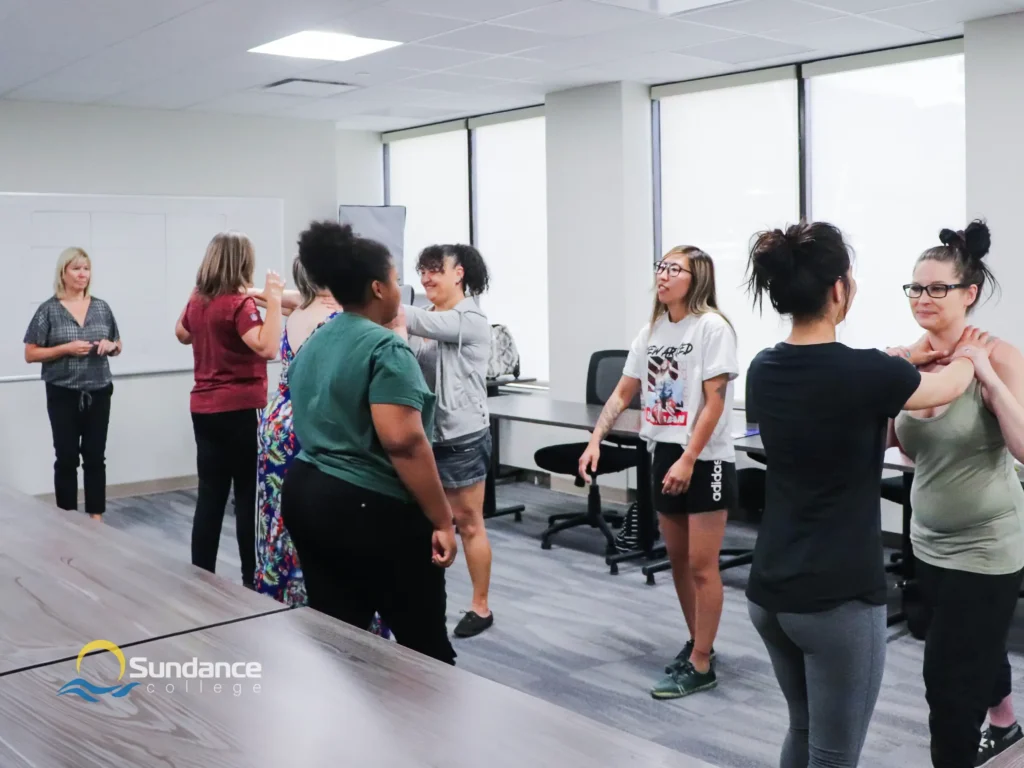
In the field of addictions, you might work with clients who are using substances that can make them behave unpredictably. It’s important to know how to handle these situations safely and effectively. You’ll need to be taught specific strategies and skills, like role-playing and intervention techniques, to be able to professionally aid people at risk in challenging times.
Cinthya shares that, “one of the offshoot components of the ACHP program is the Non-Violent Crisis Intervention course. It equips our students with practical skills for handling intense situations and de-escalating conflicts, particularly crucial when working in addiction-related roles.”
No matter what learning format you choose – online or in-person – in programs like Sundance’s Addictions and Community Health, you will be able to practice relapse prevention and intervention skills through role-playing exercises. This will help you develop your confidence when supporting clients in challenging situations.
Ethics & Harm Reduction
One of the key components in our Addictions and Community Health Diploma is the Ethics course. Serena explains: “If you’re in that client-counsellor role or mental health advocacy role, you have to realize that there’s a power dynamic first, which means you already have power over the client. Ethics is a huge part there. You have to make sure that you approach your work ethically.”
During the Ethics course, students also benefit from learning how to address their own traumas, provide personal support, and maintain ethical boundaries with clients. According to Serena, “You need to have supports, whether it’s from your family or faculty, and ensure you are unpacking that trauma, the stuff that you’ve already dealt with personally, but also the stuff that you’re going to be seeing.”
By prioritizing ethics, you can learn how to navigate complex ethical dilemmas and uphold the highest standards of integrity and professionalism in your work with clients. This ethical foundation is essential for building trust and providing effective support to people and communities affected by addiction.
The Importance of Hands-on Learning for Your Career in Addictions
Alongside the theoretical part of the studies, some programs, including Sundance’s ACHP Diploma, provide extensive practical training in addictions. It equips students with a range of practical skills, enabling them to effectively navigate diverse and challenging situations encountered in the field.
Our ACHP instructor Serena emphasizes the practical application of case studies and example discussion questions. She explains: “The most applicable and practical hands-on approach is when we throw case examples or case studies at students and then unpack some of the choices they make, whether it’s right or wrong, and understanding the ‘why’ behind it, so they can move forward and go into the fields knowing how to navigate that.”
Through hands-on learning, you gain invaluable experience in problem-solving, harm reduction, client interaction, and many other essential aspects, preparing you to work in the addictions field with confidence and empathy.
Practicums also provide invaluable hands-on learning experiences. They enhance skill development, foster confidence, and deepen understanding, equipping you with practical expertise for your future career. Additionally, you’ll be instilled with something of utmost importance – a long-term perspective.
Our ACHP instructor Cinthya notes, “While they’re in their practicum, students may witness positive change in those they work with, but it’s not guaranteed. We prepare them early on to understand that change often takes time. As helping professionals, we’re planting seeds that may take years to bear fruit. That’s part of what we, instructors, prepare students for in the ACHP program, is to understand that change takes a long time.”
Preparing for a career in addictions and community health can’t rely solely on unrelated work experience or on-the-job training. You’re dealing with people’s lives and your own well-being, so success in this field hinges on the right education – that’s what opens doors to multiple career opportunities.
What Can You Do with a Diploma in Addictions?
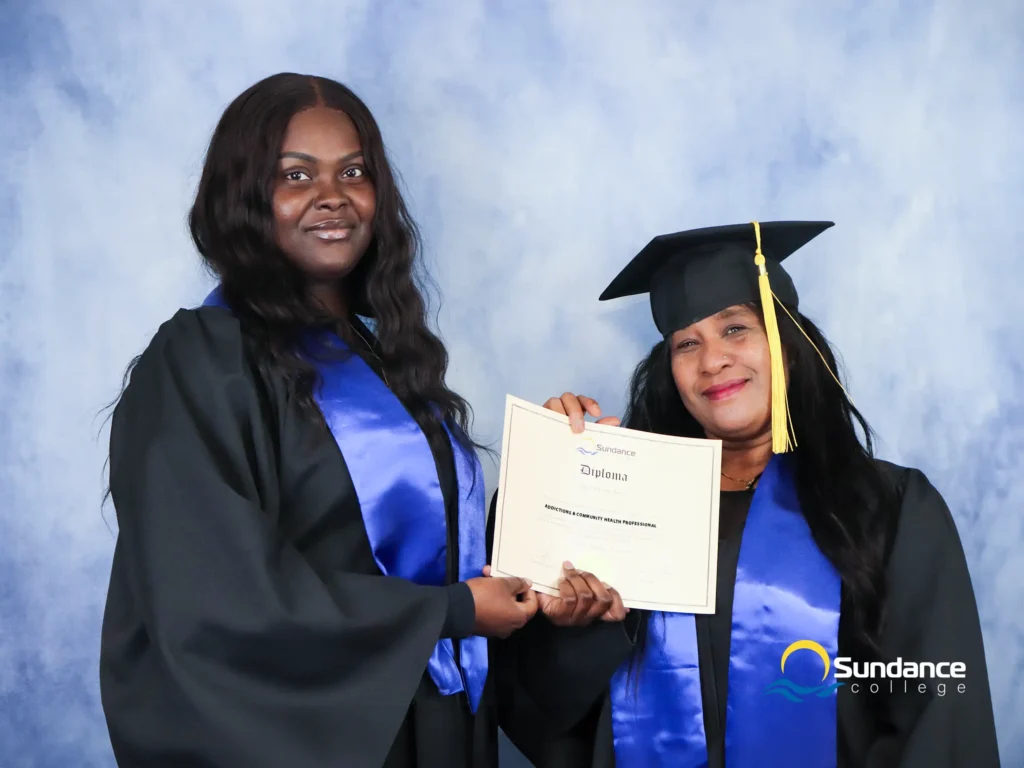
Your potential career paths after graduation include, but are not limited to:
- Addictions and Mental Health Worker
- Family Support Worker
- Child and Youth Care Worker
- Social Support Worker
- Peer Outreach Worker
- Shelter Support Worker
- Corrections Facilities Worker
Serena, our ACHP instructor, advises, “Don’t hyperfocus solely on addiction. Explore community health to discover which population you want to work with. You might thrive working with adults with disabilities or find your passion in youth services. Stay open to different populations and different clients and try various organizations or programs.”
Take the first step towards your meaningful career in addictions today. Fill out our contact form, and our advisor will reach out to discuss your options.
Related Blogs
Subscribe for more career advice
Blog Categories
Share on:
